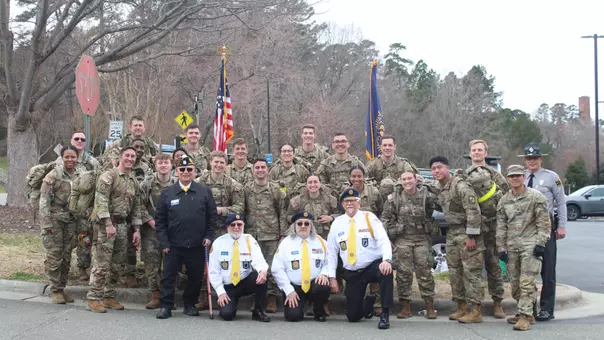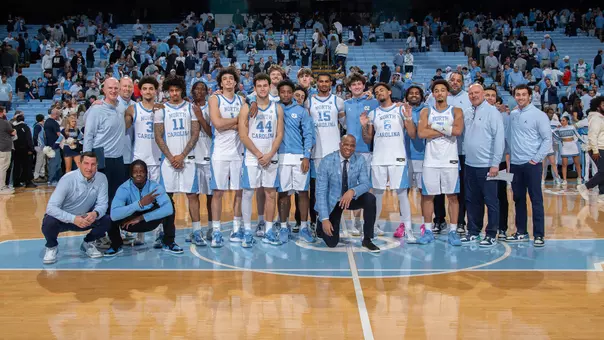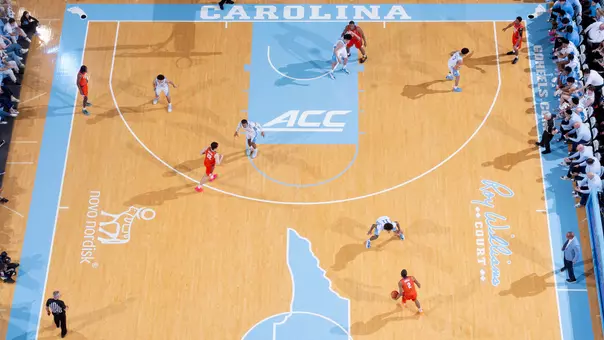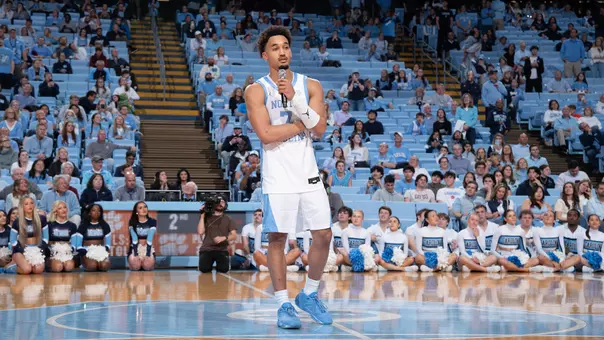University of North Carolina Athletics
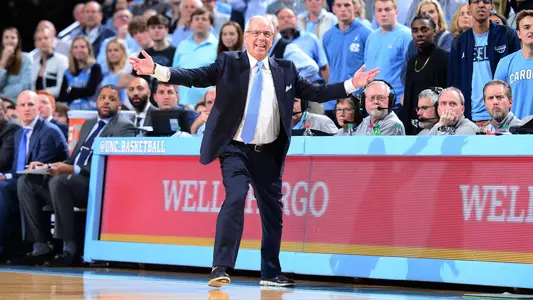
Photo by: Jeffrey A. Camarati
Lucas: Definitions
January 8, 2020 | Men's Basketball, Featured Writers, Adam Lucas
Carolina needs to develop an identity very soon.
By Adam Lucas
Let's talk about the comment.
In the wake of Carolina's 73-65 defeat to Pittsburgh, a game that featured a major second half collapse from the Tar Heels, there's going to be plenty of chatter about Roy Williams' comments earlier this week on his radio show. It was prominently mentioned around the Smith Center on Wednesday night, on the lips of fans around the building.
The part you've probably already heard was one sentence: "It's the least gifted team I've coached since I've been back here."
That one comment somehow became ESPN.com front page news for over 24 hours. Not as hotly discussed was whether the head coach was simply stating a fact. This is his 17th North Carolina team. Which one, exactly, had less talent than this one? The 2010 team had Ed Davis, Tyler Zeller, John Henson and Deon Thompson, plus Marcus Ginyard and Leslie McDonald. All six of those players would start on this team.
And yes, the simple comeback is that the head coach recruited these players, so he's responsible for them. That's completely true. Williams never said otherwise, even though he knows part of the recruiting cycles that make up this team were limited by NCAA nonsense that turned out to be nothing, and that the team's best player is sidelined by an injury.
But here's the bottom line: none of that matters. What the story has become is not at all what Williams meant. The context gives you a much better idea of the point he was trying to make, although you likely won't see this on ESPN.com. "So, if you're going to be like that (not as much raw talent), you need to bring your A-game even though your A-game might not even be an A-game," he continued. "You've got to bring your best game to play on game day, and for us to have a practice on Friday, we were flying around defensively. I told them, 'It's the best defensive practice we've had all year,' and a team shoots 59 percent on us 24 hours later. So, we didn't bring that on game day."
That's the frustration. Not that the Tar Heels somehow aren't talented enough to produce against an ACC opponent. But that they didn't compete against an ACC opponent—and there's a difference. On Wednesday, after two days of reminders at practice, they had some of the same issues.
Pittsburgh shot 58 percent from the field in the decisive second half, in which they outscored Carolina by 17 points and the Tar Heels appeared to go into an offensive shell in the final five minutes. They made three-pointers. They made dunks. They very much largely did what they wanted to do in the final 20 minutes without very much resistance.
That's the kind of effort Williams tried to eliminate at practice the last two days. The gifted comment wasn't intended to be an excuse, either for the players or the coach. It was intended to explain the makeup of the team. It was a challenge, the kind that Williams loves, and wants his teams to love. They don't have overwhelming raw talent. So in order to be competitive in the ACC, they have to play as close to their potential as they possibly can on every single night.
That's why, before Monday's practice—the team's first session since the disappointing effort on Saturday—Williams brought John Kuester to center court at the Smith Center. With the team gathered around him, the head coach correctly assessed that there weren't many of the current players who knew who Kuester might be. Remember, Armando Bacot was five years old when Tyler Hansbrough enrolled at Carolina. Half of this year's team is surprised that Sean May's game film isn't in black and white.
"You know who this guy is?" Williams asked his team as he patted Kuester on the back. "He was the ACC Tournament MVP. He was the NCAA Tournament regional MVP."
He's right—Kuester isn't physically imposing, but he won both those awards in his senior season, the 1976-77 campaign. He didn't win them because he was the most gifted player on the court. He won them because he was one of the toughest, and because he maximized his ability on a consistent basis.
That's the message Williams is trying to get across, and perhaps the message that will ultimately determine the course of this season. This team can not—will not—out-talent many opponents that are left on the schedule. But that doesn't in any way mean they are hopeless.
Instead, it simply means they have to decide if they're willing for that to be their identity. Would you rather be defined as "not very gifted" or "a bunch of tough little nuts"? They have to decide in the very near future is if they're willing to outcompete some of the opposition. Garrison Brooks is not the most talented player on the current roster, but he's the most productive. He's not doing it with pure talent. How is he doing it? That's something his teammates will be asked to notice.
Right now, the rest of the Atlantic Coast Conference is giddy. This might be the year, might just be the season, that they can finally get some revenge on the Tar Heels. The early January book on the Tar Heels is they are defined not by a lack of talent, but by a lack of toughness. Pittsburgh absolutely believed they could get a basket whenever they needed it against Carolina...and then they went out and shot 58 percent in the second half.
You can be certain that Williams will try every possible method to get something more out of his 2020 team. He'll yell. He'll encourage. He'll put in a couple new offensive sets. He'll add a defensive wrinkle.
But he is absolutely, clinically, pathologically incapable of giving up. Which means the season isn't over, no matter how it might feel tonight.
Carolina has two practices between now and Saturday's date with Clemson. The goal won't be to get more gifted. The goal will be to get a little tougher, and a little smarter, and a little more cohesive. That 1977 team had—among others—Phil Ford, one of the greatest players in program history. And yet the award-winner was Kuester.
There's a lesson there for this year's team. Now Williams has to figure out how to help them understand it.
Let's talk about the comment.
In the wake of Carolina's 73-65 defeat to Pittsburgh, a game that featured a major second half collapse from the Tar Heels, there's going to be plenty of chatter about Roy Williams' comments earlier this week on his radio show. It was prominently mentioned around the Smith Center on Wednesday night, on the lips of fans around the building.
The part you've probably already heard was one sentence: "It's the least gifted team I've coached since I've been back here."
That one comment somehow became ESPN.com front page news for over 24 hours. Not as hotly discussed was whether the head coach was simply stating a fact. This is his 17th North Carolina team. Which one, exactly, had less talent than this one? The 2010 team had Ed Davis, Tyler Zeller, John Henson and Deon Thompson, plus Marcus Ginyard and Leslie McDonald. All six of those players would start on this team.
And yes, the simple comeback is that the head coach recruited these players, so he's responsible for them. That's completely true. Williams never said otherwise, even though he knows part of the recruiting cycles that make up this team were limited by NCAA nonsense that turned out to be nothing, and that the team's best player is sidelined by an injury.
But here's the bottom line: none of that matters. What the story has become is not at all what Williams meant. The context gives you a much better idea of the point he was trying to make, although you likely won't see this on ESPN.com. "So, if you're going to be like that (not as much raw talent), you need to bring your A-game even though your A-game might not even be an A-game," he continued. "You've got to bring your best game to play on game day, and for us to have a practice on Friday, we were flying around defensively. I told them, 'It's the best defensive practice we've had all year,' and a team shoots 59 percent on us 24 hours later. So, we didn't bring that on game day."
That's the frustration. Not that the Tar Heels somehow aren't talented enough to produce against an ACC opponent. But that they didn't compete against an ACC opponent—and there's a difference. On Wednesday, after two days of reminders at practice, they had some of the same issues.
Pittsburgh shot 58 percent from the field in the decisive second half, in which they outscored Carolina by 17 points and the Tar Heels appeared to go into an offensive shell in the final five minutes. They made three-pointers. They made dunks. They very much largely did what they wanted to do in the final 20 minutes without very much resistance.
That's the kind of effort Williams tried to eliminate at practice the last two days. The gifted comment wasn't intended to be an excuse, either for the players or the coach. It was intended to explain the makeup of the team. It was a challenge, the kind that Williams loves, and wants his teams to love. They don't have overwhelming raw talent. So in order to be competitive in the ACC, they have to play as close to their potential as they possibly can on every single night.
That's why, before Monday's practice—the team's first session since the disappointing effort on Saturday—Williams brought John Kuester to center court at the Smith Center. With the team gathered around him, the head coach correctly assessed that there weren't many of the current players who knew who Kuester might be. Remember, Armando Bacot was five years old when Tyler Hansbrough enrolled at Carolina. Half of this year's team is surprised that Sean May's game film isn't in black and white.
"You know who this guy is?" Williams asked his team as he patted Kuester on the back. "He was the ACC Tournament MVP. He was the NCAA Tournament regional MVP."
He's right—Kuester isn't physically imposing, but he won both those awards in his senior season, the 1976-77 campaign. He didn't win them because he was the most gifted player on the court. He won them because he was one of the toughest, and because he maximized his ability on a consistent basis.
That's the message Williams is trying to get across, and perhaps the message that will ultimately determine the course of this season. This team can not—will not—out-talent many opponents that are left on the schedule. But that doesn't in any way mean they are hopeless.
Instead, it simply means they have to decide if they're willing for that to be their identity. Would you rather be defined as "not very gifted" or "a bunch of tough little nuts"? They have to decide in the very near future is if they're willing to outcompete some of the opposition. Garrison Brooks is not the most talented player on the current roster, but he's the most productive. He's not doing it with pure talent. How is he doing it? That's something his teammates will be asked to notice.
Right now, the rest of the Atlantic Coast Conference is giddy. This might be the year, might just be the season, that they can finally get some revenge on the Tar Heels. The early January book on the Tar Heels is they are defined not by a lack of talent, but by a lack of toughness. Pittsburgh absolutely believed they could get a basket whenever they needed it against Carolina...and then they went out and shot 58 percent in the second half.
You can be certain that Williams will try every possible method to get something more out of his 2020 team. He'll yell. He'll encourage. He'll put in a couple new offensive sets. He'll add a defensive wrinkle.
But he is absolutely, clinically, pathologically incapable of giving up. Which means the season isn't over, no matter how it might feel tonight.
Carolina has two practices between now and Saturday's date with Clemson. The goal won't be to get more gifted. The goal will be to get a little tougher, and a little smarter, and a little more cohesive. That 1977 team had—among others—Phil Ford, one of the greatest players in program history. And yet the award-winner was Kuester.
There's a lesson there for this year's team. Now Williams has to figure out how to help them understand it.
Players Mentioned
UNC Women's Lacrosse: Humphrey Fires Tar Heels Past Clemson, 12-9
Thursday, March 05
UNC Softball: Long Ball Propels Heels Over Stetson, 12-4
Thursday, March 05
THE ARENA DISCUSSION - Episode 2: Rick Steinbacher
Wednesday, March 04
MBB: Seth Trimble Senior Speech - March 3, 2026
Wednesday, March 04










